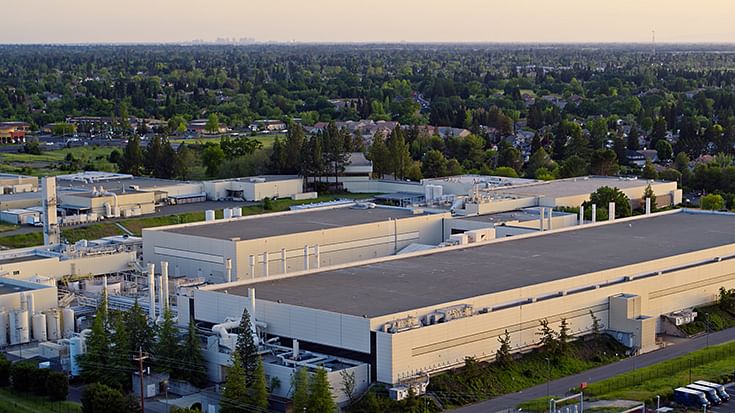Bosch to acquire US chipmaker TSI Semiconductors, expand semiconductor business
Rising demand from EV industry for silicon carbide chips, which enable increased range and more efficient recharging, sees Bosch make moves to expand its global portfolio of SiC semiconductors.
Bosch is expanding its semiconductor business with silicon carbide chips. The technology company plans to acquire assets of the U.S. chipmaker TSI Semiconductors, based in Roseville, California.
With a workforce of 250, TSI Semiconductors is a foundry for application-specific integrated circuits, or ASICs. Currently, it mainly develops and produces large volumes of chips on 200-millimetre silicon wafers for applications in the mobility, telecommunications, energy, and life sciences industries.
Over the next years, Bosch intends to invest more than US$ 1.5 billion in the Roseville site and convert the TSI Semiconductors manufacturing facilities to state-of-the-art processes. Starting in 2026, the first chips will be produced on 200-millimetre wafers based on the innovative material silicon carbide (SiC).
n this way, Bosch is systematically reinforcing its semiconductor business, and will have significantly extended its global portfolio of SiC chips by the end of 2030. Above all, the global boom and ramp-up of electromobility are resulting in huge demand for such special semiconductors.
“With the acquisition of TSI Semiconductors, we are establishing manufacturing capacity for SiC chips in an important sales market while also increasing our semiconductor manufacturing, globally. The existing clean-room facilities and expert personnel in Roseville will allow us to manufacture SiC chips for electromobility on an even larger scale,” said Dr. Stefan Hartung, the chairman of the Bosch board of management.
“The location in Roseville has existed since 1984. Over nearly 40 years, the U.S. company has built up vast expertise in semiconductor production. We will now be integrating this expertise into the Bosch semiconductor manufacturing network,” added Dr. Markus Heyn, member of the Bosch board of management and chairman of the Mobility Solutions business sector.
“We are pleased to join a globally operating technology company with extensive semiconductor expertise. We are confident that our Roseville location will be a significant addition to Bosch’s SiC chipmaking operations,” said Oded Tal, CEO at TSI Semiconductors.
 Bosch plans to invest more than US$ 1.5 billion (Rs 12,370 crore) to convert the TSI Semiconductors manufacturing facilities in Roseville, California, to state-of-the-art processes.
Bosch plans to invest more than US$ 1.5 billion (Rs 12,370 crore) to convert the TSI Semiconductors manufacturing facilities in Roseville, California, to state-of-the-art processes.
Creating new manufacturing capacity
The new location in Roseville will reinforce Bosch’s international semiconductor manufacturing network. Starting in 2026, following a retooling phase, first SiC chips will be produced on 200-millimeter wafers.
At an early stage, Bosch invested in the development and production of SiC chips. Since 2021, it has been using its own proprietary, highly complex processes to mass-produce them at its Reutlingen location near Stuttgart. In the future, Reutlingen will also produce them on 200-millimetres wafers. By the end of 2025, the company will have extended its clean-room space in Reutlingen from roughly 35,000 to more than 44,000 square meters. “SiC chips are a key component for electrified mobility. By extending our semiconductor operations internationally, we are strengthening our local presence in an important electric vehicle market,” Heyn says.
“SiC chips are a key component for electrified mobility. By extending our semiconductor operations internationally, we are strengthening our local presence in an important electric vehicle market," said Dr Markus Heyn.
Strong demand for chips from automotive industry
Demand for chips for the automotive industry remains high. By 2025, Bosch expects to have an average of 25 of its chips integrated in every new vehicle. The market for SiC chips is also continuing to grow fast – by 30% a year on average. The main drivers of this growth are the global boom and ramp-up of electromobility. In EVs, SiC chips enable greater range and more efficient recharging, as they use up to 50% less energy. Installed in these vehicles’ power electronics, they ensure that a vehicle can drive a significantly longer distance on one battery charge – on average, the possible range is 6 percent greater than with silicon-based chips.
RELATED ARTICLES
Autoliv Plans JV for Advanced Safety Electronics With China’s HSAE
The new joint venture, which is to be located strategically near Shanghai and close to several existing Autoliv sites in...
JLR to Restart Production Over a Month After September Hacking
Manufacturing operations at the Tata Group-owned British luxury car and SUV manufacturer were shut down following a cybe...
BYD UK Sales Jump 880% in September to 11,271 units
Sales record sets the UK apart as the largest international market for BYD outside of China for the first time. The Seal...






 By Autocar Professional Bureau
By Autocar Professional Bureau
 28 Apr 2023
28 Apr 2023
 6286 Views
6286 Views










 Ajit Dalvi
Ajit Dalvi




